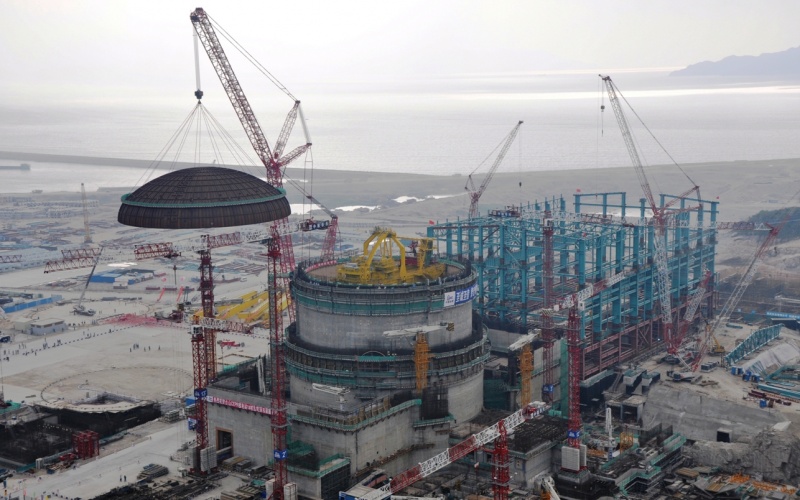NIMBYism is on the rise in China, and without better dialogue between stakeholders, threatens to undermine Beijing’s nuclear plans and efforts to meet its COP21 goals.

Over the past two weeks, thousands of residents of Lianyungang, a town in Jiangsu province, have gathered,halting preparations for a proposed nuclear waste reprocessing plant. Lianyungang is one of six sites under consideration for the project, but the two companies developing the plant, China National Nuclear Co. (CNNC) and France’s Areva, have not yet decided on a final location.
China’s ambitious nuclear plans
The proposed fuel reprocessing center would recycle spent fuel to create new fissile material. This process also reduces the final volume of nuclear waste that needs to be stored. Currently, spent fuel is stored onsite at the power plant, usually first in cooling pools and then in dry casks. Long term storage facilities, such as the controversial Yucca mountain repository in Nevada, have been unsuccessful in gaining regulatory approval. However, on-site waste storage is not viable in the long term, and fuel reprocessing centers, like the proposed $15 billion CNNC-Areva project, will be critical to the viability of nuclear energy in China.
China currently has the fastest growing civil nuclear program in the world, with 34 reactors online and 20 under construction. The 13th Five Year Plan, released in March 2016, outlined a goal of reaching 58 GWe of nuclear power capacity by 2020. To meet this goal, China will have to build reactors at a rate of eight new reactors per year between now and 2020.
The town of Lianyungang is already home to the Tianwan power plant, a complex that houses two 1,000 MW reactors. Phase II (Tianwan 3 and 4) are currently under construction, and Phase III (Tianwan units 5 and 6) gained approval in December 2015; approval that had been suspended after the Fukushima Daiichi meltdowns. Tianwan 3 is expected to come online this year and Tianwan 4 in 2017. Tianwan 5 should enter commercial operation in 2021, if construction proceeds as planned.
Chinese state media has attributed the movement in Lianyungang to “nimbyism.” The NIMBY (Not In My Backyard) mentality has led to the suspension or cancellation of other industrial projects in China, such as praxylene or waste incinerator plants.
Lack of public input fuels opposition
There is growing advocacy in China for an expanded role for public input in planning these projects – currently decisions at the planning stages are made with little input from residents: “for many local residents, there is no absolute guarantee that those projects, if built in their neighborhood, can be 100 percent safe. If there is some harm, they will bear the brunt of the costs and risks. The best way to defuse their suspicions is to make the projects transparent and involve the public.”
The nimbyism surge is due to increased awareness on the part of the public of the environmental issuesfacing China, as well as a lack of appreciation for the public good that would be provided by these industrial projects.
As revealed by the Lianyungang’s protests, a sticking point for China’s nuclear development moving forward will be local opposition to the industry in affected communities. A study carried out in 2012, in Shandong province, surveying residents living within the vicinity of the Haiyang power plant found that residents were largely uninformed on nuclear power in their area, the concentration of decision making within national agencies and industry, which when compounded by a lack of accessible information, resulted in a low level of trust in the decision making apparatus.
Similarly, a 2012 survey of residents near the Tianwan power plant found widespread concern about the safety of nuclear power plants, particularly in the event of a nuclear accident. While the degree of public acceptance may vary, China’s nuclear industry and regulation process needs to work to create more platforms on which they can promote engagement and make information more accessible to the public.
China has made it clear that nuclear power will play a significant role in the country’s energy mix. Indeed, the incorporation of nuclear power is China’s integral to Beijing keeping its COP21 commitments, as it provides a low-carbon replacement for coal-fired electricity.
However, the key to success for nuclear energy in China is effective communication between the nuclear industry and the communities within which it operates, to ensure that residents and community stakeholders are given sufficient information to understand the benefits of nuclear power. Given China’s infamous problems with air pollution, residents should have an interest in protecting a stable source of zero-carbon energy in their communities.
Advocates of nuclear power need a better vehicle to reach and work with community stakeholders; without dialogue between communities and industry representatives, public opinion and irrational safety fears could impede the continued development of nuclear energy in China.
sourche: http://globalriskinsights.com/2016/08/nimbyism-threatens-china-nuclear-plans/


Δεν υπάρχουν σχόλια:
Δημοσίευση σχολίου